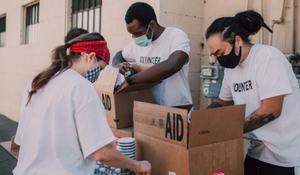As the COVID-19 pandemic begins to recede after killing 1,000,000 of our fellow citizens in two years, social workers who deal in public policy are asking the question, "How did our society let this deadly disease get so out of control and do so much damage?"
Read More
Topics:
social workers,
social issues,
Covid-19/Pandemic
Covid-19 is still a hot topic in both the national and international media. The virus, which originated in Wuhan, China, has caused widespread panic and has had a significant impact on the global economy. The number of confirmed cases fluctuates as one variant runs its course until another new variant appears. Countries are taking drastic measures to try to control the virus's spread and subsequent variants. Millions of people have died as a result of the virus, and many more have been infected. The pandemic has forced businesses to close, disrupted global supply chains, and caused global stock markets to plummet. Economists are concerned that the economic upheaval will continue indefinitely.
Read More
Topics:
Homeless & Food Pantry,
social issues,
Covid-19/Pandemic
The entire civilized world is suffering from a form of collective PTSD. Social workers report being overwhelmed with cases of alcoholism, drug addiction, anxiety, divorce, depression, and suicide. The Center for Disease Control and Prevention says: "Suicide rates in the United States are often the result of circumstances beyond the individual's control. People who die by suicide report an unshakeable feeling of dread, despair, loneliness, and hopelessness."
Read More
Topics:
mental health,
Covid-19/Pandemic
Pandemic related labor shortages are threatening the nonprofit sector's recovery. Many smaller nonprofits, virtually shut down during the worst of COVID-19, have begun to revitalize but find progress hampered by a shortage of qualified personnel. Large corporations have raided the nonprofit personnel ranks with lucrative pay increases, flexible work hours, and work from home options that smaller nonprofits find it difficult to match.
Read More
Topics:
Nonprofit General,
nonprofit mission,
nonprofit management,
Covid-19/Pandemic
COVID-19 has drastically changed the whole world. From food shortages to problems in the healthcare sector, we’ve seen a wide range of problems since the start of the pandemic in 2020. In these challenging circumstances, NGOs play a vital role in helping individuals get their lives back on track.
Here's a few examples of how NGO's are adapting in an ever-changing pandemic era. They are finding different ways to rise to the needs and demands placed on them during these turbulent times.
Read More
Topics:
social services software,
Covid-19/Pandemic
The COVID-19 pandemic has caused social workers to take a closer look at their ingrained prejudices when dealing with the aged. Robert N. Butler coined the term “ageism" in 1969 to describe attitudes, practices, and policies that discriminate against older people. Ageism occurs when people face stereotypes, prejudice, or discrimination because of their age. The assumption that all older people are frail and helpless is a common, incorrect stereotype. Prejudice can consist of feelings such as “older people are unpleasant and difficult to deal with.” Discrimination is evident when older adults’ needs aren’t recognized and respected or when they’re treated less favorably than younger people. Social workers who work with the elderly are realizing that even in their minds age is “a category of difference” like race and gender, but unlike race and gender, age positions older adults as a homogenous group with similar needs.
Read More
Topics:
Elderly/Aging Long Term Care,
social issues,
Covid-19/Pandemic
It’s been estimated that globally, around 76 million people have been diagnosed with anxiety disorders due to the pandemic. Many of these people were healthy individuals with no previously diagnosed mental health issues. Others were already diagnosed with mental health issues, but the virus served as a trigger for their disorders and made them worse.
Nonetheless, social workers across the US have played an important role in ensuring that people suffering from mental health issues during the pandemic have the necessary psychological support to survive the pandemic.
Read More
Topics:
mental health,
human services software,
Covid-19/Pandemic
COVID-19 has affected the world and its societies at unprecedented levels. Ever since the first few cases were reported in the US, things have been spiraling out of the control for both governments and healthcare authorities alike.
A lot of families have lost their loved ones while others are dealing with the long-term side effects of the virus. It’s not as easy for them to adapt to the new normal that others are embracing.
Read More
Topics:
Social Services Industry News,
case management software,
social services software,
Covid-19/Pandemic
Nearly 500,000 people died from opioid overdoses from 1999-2019. This epidemic of opioid overdose deaths can be outlined in three distinct waves.
- The first wave began with increased prescribing of opioids in the 1990s, with overdose deaths involving prescription opioids (natural and semi-synthetic opioids and methadone) increasing since at least 1999.
- The second wave began in 2010, with rapid increases in overdose deaths involving heroin.
- The third wave began in 2013, with significant increases in overdose deaths involving synthetic opioids, particularly those involving illicitly manufactured fentanyl. More than 14,000 deaths involving illicitly manufactured synthetics occurred in 2019, which is equivalent to about 38 deaths per day.
Read More
Topics:
mental health,
social workers,
Covid-19/Pandemic










